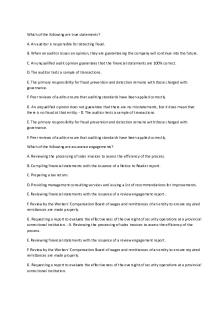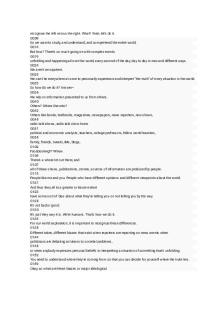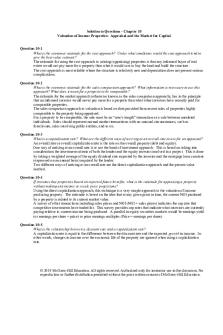Personality Quiz For Teens PDF

| Title | Personality Quiz For Teens |
|---|---|
| Author | Kenma Kozume |
| Course | Bio-Medical Ethics |
| Institution | University of Northern Iowa |
| Pages | 9 |
| File Size | 370.7 KB |
| File Type | |
| Total Downloads | 99 |
| Total Views | 145 |
Summary
wefwefqwddwqd...
Description
Personality Assessment Get to know the Jungian Mental Mechanisms and the Keirsey Temperaments a.k.a. Personality Styles
In honor of Carl Gustav Jung and his impactful insights into the human mind, you may duplicate and distribute this document freely. This document must be duplicated “as-is” without alteration. Copyright must remain intact on all pages. To modify or reproduce this document in another publication you must request written permission from the author: [email protected]
This personality assessment is intended for use by individuals 13 years of age or older. Release of Liability: The information presented here is provided only as general educational material and is not psychological or medical advice. By utilizing this educational material, you agree to fully release, defend, indemnify, and hold harmless, Personality Academy and its authors from any claim or liability whatsoever and for any damage or injury of whatsoever nature, which a participant or affiliate may incur, arising at any time out of or in relation to your use or misuse of the information presented in this material. Cres Woods PO BOX 578 Ishpeming, MI 49849 [email protected] www.PersonalityAcademy.com The four personality style descriptor terms found in this guide (Mover, Connector, Thinker, and Planner) are used with permission from www.PersonalityLingo.com. Personality Lingo is a registered trademark of Mary Miscisin. Edited by Vicki Brown www.philtres.com 7th Release June 2020 Facilitation Notes: This personality assessment is designed to provide insights into the motivations behind behaviors, promote understanding of individual differences, and lay the foundation for Emotional Intelligence. (1) When determining their Personality Style Lineup, direct students to read through the descriptions of the personality styles on page 7 and list the styles in order from what sounds most like them to least like them. They may use the assessment results to guide them but their determination of their personality lineup from reading the style descriptions takes precedence over the assessment results. (2) Provide avenues for the students to relate to the styles in different contextual situations – this can be accomplished by means of storytelling, a skit, or movie analysis. (3) Provide opportunities for students to work together in “most dominant style groups”. Ask them to discuss and come to consensus on their top strengths, joys, most misunderstood, what brings out the best, etc. These group discussions empower students to realize that there are others who have a lot in common with them. Have each group report out to the entire class and teach each other. Learning about the other styles instills empathy and fosters emotional intelligence. The goal is for students to feel valued, validated, and understood.
Personality Assessment This personality assessment helps you determine your “psychological type preferences” as well as your “personality style lineup.” Twenty situational-based questions guide you through an exploration of the Jungian Mental Mechanisms to see if you have any clear preferences. By scoring the assessment yourself, you will learn which combinations of mental mechanisms make up each of the four Keirsey Temperaments a.k.a. Personality Styles. When individuals share preferences, they see things the same way and tend to get along well. When their preferences are in contrast, misunderstandings naturally occur. Recognizing behavior patterns in ourselves and others helps us to understand each other even when we don’t see things the same way.
Your personality style lineup can be thought of as an internal compass. It produces a strong urge or drive that pulls you in the direction of your core values such as harmony, competency, responsibility, or immediacy. You may feel “lost” when not following your true nature.
Everyone possesses all of the Jungian Mental Mechanisms described here and the free will to apply them to different life circumstances. Some of us have come to clearly favor one mechanism over its opposite, either by way of a natural-born inner disposition or as an adaptation to outer circumstances. Life experiences generally require us to adapt and operate outside our comfort zones in order to overcome obstacles. We may excel early at behaviors that are adaptive and not find opportunities to fully develop our natural traits until later in life. It can take years of trying on the different qualities to identify which ones feel like a more natural fit. When circumstances are in alignment with our core values and we are expressing our natural traits we feel energized, alive, and on path. When external events go against our core values and we are unable to express our natural traits – we may feel drained, sluggish, and unmotivated.
Instructions 1. Please record your answers on the Response Key. 2. Select the statement that best describes your most natural way of operating given a comfortable environment. 3. Try to proceed quickly and not overthink each response. 4. If you are unable to choose between answers because you can think of circumstances where you do one or the other, simply select both answers and move on.
Personality Assessment Page | 1 © 2020 Personality Academy
General Orientation 1. Study Environment a. prefer to study in a group - discussing the material b. prefer to study alone - away from distractions if possible 2. How Thoughts Form a. process thoughts out load - through conversations with others b. process thoughts silently - inside my head 3. Speaking Style a. fast pace, expressive tones, and large gestures b. moderate pace, quiet voice, minimal gesturing 4. Relationship with Silence a. uncomfortable with long silences - especially around others b. appreciate silence - even around others 5. Energy Drainers and Gainers a. Most often find interacting with groups of people to be energizing b. Most often find interacting with groups of people to be draining If you enjoy interacting with others in moderate amounts, select both answers to Question #5.
Modes of Operation 6. Packing for a Trip a. pack in advance for a trip, at least the night before b. pack the very last minute for a trip 7. Closure vs. Leaving Options Open a. prefer to have decisions made b. prefer to keep options open as long as possible 8. Relationship with Schedules a. find schedules and routines comforting b. find schedules and routines restricting 9. Natural Tendency a. crave consistency and enjoy being prepared b. crave variety and enjoy improvising 10. Work Style a. “work before play” b. “play along the way” Personality Assessment Page | 2 © 2020 Personality Academy
Information Gathering 11. Strengths a. good at building, maintaining, and operating things b. good at developing insights into creative designs 12. Ways of Perceiving a. trust only what I can see, hear, touch, taste, or smell b. comfortable using imagination and following hunches 13. Integration a. put pieces together one step at a time b. put pieces together from all directions at once 14. Interpretation a. the way things appear is the way they really are b. read between the lines to discover hidden meaning 15. Outlook a. prefer to experience life here and now b. enjoy contemplating patterns and future possibilities
Decision-Making 16. Decisions a. use logic to make decisions and seek clarity b. use feelings to make decisions and seek harmony 17. Needs a. sincere need to evaluate and improve b. sincere need to know that others care how you feel 18. Perspective a. tend to debate and defend point of view b. tend to sympathize and accept other people’s opinions 19. Movie-Watching a. mistakes in a movie significantly lessen enjoyment b. able to look past mistakes and enjoy a movie 20. Preferred Approach a. objective, direct, and investigative b. subjective, tactful, and appreciative Personality Assessment Page | 3 © 2020 Personality Academy
Response Key Draw a circle around the letter that corresponds with your response for each question. Count the marks for each column and fill-in the totals at the bottom of the table.
General Orientation
Modes of Operation
1.
a
b
6.
a
b
2.
a
b
7.
a
b
3.
a
b
8.
a
b
4.
a
b
9.
a
b
5.
a
b
10.
a
b
Total:
1
5
Total:
4
1
Extraversion
Introversion
Planned
Spontaneous
Information Gathering
Decision-Making
11.
a
b
16.
a
b
12.
a
b
17.
a
b
13.
a
b
18.
a
b
14.
a
b
19.
a
b
15.
a
b
20.
a
b
Total:
2
3
Totals:
2
3
Hands-On
Theoretical
Objective
Subjective
A relatively higher score in one column of a table indicates a “psychological type preference”. Where the scores in both columns are close to each other, you may find that you naturally switch back and forth between each mental mechanism as the situation demands.
Personality Assessment Page | 4 © 2020 Personality Academy
Insights into the Jungian Mental Mechanisms Circle any preferences for each pair of Jungian Mental Mechanisms:
Extraversion
Introversion
Planned
Spontaneous
Hands-On
Theoretical
Objective
Subjective
General Orientation: Extraversion – Introversion Extraverts tend to speak freely about whatever is on their mind. They develop their thoughts by talking through them with others. Extraverts gain energy from chatting with others. Introverts are somewhat more territorial with their mental space and personal space. They need time to think and reflect before sharing their thoughts. Introverts gain energy from quiet time.
Modes of Operation: Planned – Spontaneous Individuals who have a preference for operating in a planned manner find comfort in following routines and schedules. They have an innate drive to make decisions as soon as possible and bring things to closure. Individuals who have a preference for operating in a spontaneous manner find schedules and routines restricting. They have an innate drive to keep options open. They crave variety and flexibility and may change their minds often.
Information Gathering: Hands-On – Theoretical Individuals who prefer hands-on gathering of information using their five senses focus on the present moment and proceed one step at a time. They appreciate clear objectives and tangible results. Individuals who prefer theoretical gathering of information by means of insights focus on future possibilities and pull from all directions at once to see the big picture. They appreciate opportunities to be creative and use their imagination.
Decision-Making: Objective- Subjective Individuals who prefer making decisions objectively seek clarity and have a sincere need to evaluate and improve. They make decisions based on logic and impersonal facts. Individuals who prefer making decisions subjectively seek harmony and need to know that others care how they feel. They make decisions based on values and personal impact. Personality Assessment Page | 5 © 2020 Personality Academy
The Jungian Mental Mechanisms are the building blocks for the Keirsey Temperaments a.k.a. the four Personality Styles Place your total scores for each mental mechanism into the box next to its name. Then add the two numbers in each column together to arrive at a total score for each personality style.
Hands-On + Spontaneous = MOVER Hands-On Spontaneous MOVER
2 1 3
2 4 6
Hands-On Planned PLANNER
Theoretical + Subjective = CONNECTOR Theoretical Subjective CONNECTOR
Hands-On + Planned = PLANNER
Theoretical + Objective = THINKER Theoretical Objective THINKER
3 3 6
3 2 5
Movers and Planners both prefer hands-on gathering of information, but they differ in their mode of operation. Connectors and Thinkers both prefer theoretical gathering of information, but they differ in how they make decisions.
Your Personality Style Lineup List the personality styles in order from the one that is most like you to the one that is least like you.
Planner & Mover Thinker Connector ______________ ______________ ______________ ______________ Top Style
2nd Style
3rd Style
Last/Least Style
An individual’s preference for extraversion or introversion as well as their 2nd most dominant style significantly impacts how their most dominant style is expressed. (Introverts tend to keep their most dominant style on the inside and show their 2nd most dominant style to the outside world.) Indicate your preference for Extraversion or Introversion by either checking the box for one, or by marking a point on the line somewhere in between.
INTROVERT
EXTRAVERT Personality Assessment Page | 6 © 2020 Personality Academy
Insights into the Keirsey Temperaments a.k.a. Personality Styles Mover (SP-Orange) Personality Style Hands-On & Spontaneous Core Value: Freedom The Mover personality style is courageous, exploratory, and playful. Movers seek action and adventure. They crave variety and enjoy improvising. Movers are good at thinking on their feet. They automatically find the fastest way to do things and make them fun. They change course as often as is needed and aren’t likely to let bumps in the road slow them down.
Connector (NF-Blue) Personality Style Theoretical & Subjective Core Value: Relationship The Connector personality style is considerate, cooperative, and encouraging. Connectors seek harmony and personal connection. They prefer to make decisions that feel good and are in alignment with their values. Connectors naturally interact with others and connect meaning to events. They excel at recognizing strengths in others and place a high importance on personal growth.
Thinker (NT-Green) Personality Style Theoretical & Objective Core Value: Competency The Thinker personality style is curious, logical, and self-sufficient. Thinkers seek clarity and knowledge. They prefer to make calculated decisions. Thinkers explore all aspects of an issue and can’t help but suggest new ways of doing things. They need time to think before making decisions. They can be fiercely independent and value their privacy.
Planner (SJ-Gold) Personality Style Hands-On & Planned Core Value: Responsibility The Planner personality style is organized, prepared, and dependable. Planners seek order and fairness. They crave consistency and having things in their place. Planners are naturally able to distinguish right from wrong. They like to keep their personal space well-tended and pay attention to details. They seek a sense of completion and enjoy crossing items off a list.
Personality Assessment Page | 7 © 2020 Personality Academy...
Similar Free PDFs

Personality Quiz For Teens
- 9 Pages

Annotated Bibliography Teens 1
- 9 Pages

Pop Culture Effects on Teens
- 11 Pages

Ado and teens smoking essay
- 6 Pages

Quiz Answer for Exercise3
- 26 Pages

Programming for everyone quiz
- 19 Pages

CH11 quiz for BU127
- 7 Pages

Quiz for Module 1
- 3 Pages

Quiz for chapter 18
- 10 Pages

Auditing for Quiz 1
- 7 Pages

Quiz for Module 4
- 4 Pages

For video quiz #2
- 18 Pages

Quiz for chapter 10
- 12 Pages

Quiz for Chapter 12
- 9 Pages

Quiz 5 Tutoring Notes for quiz 3
- 10 Pages
Popular Institutions
- Tinajero National High School - Annex
- Politeknik Caltex Riau
- Yokohama City University
- SGT University
- University of Al-Qadisiyah
- Divine Word College of Vigan
- Techniek College Rotterdam
- Universidade de Santiago
- Universiti Teknologi MARA Cawangan Johor Kampus Pasir Gudang
- Poltekkes Kemenkes Yogyakarta
- Baguio City National High School
- Colegio san marcos
- preparatoria uno
- Centro de Bachillerato Tecnológico Industrial y de Servicios No. 107
- Dalian Maritime University
- Quang Trung Secondary School
- Colegio Tecnológico en Informática
- Corporación Regional de Educación Superior
- Grupo CEDVA
- Dar Al Uloom University
- Centro de Estudios Preuniversitarios de la Universidad Nacional de Ingeniería
- 上智大学
- Aakash International School, Nuna Majara
- San Felipe Neri Catholic School
- Kang Chiao International School - New Taipei City
- Misamis Occidental National High School
- Institución Educativa Escuela Normal Juan Ladrilleros
- Kolehiyo ng Pantukan
- Batanes State College
- Instituto Continental
- Sekolah Menengah Kejuruan Kesehatan Kaltara (Tarakan)
- Colegio de La Inmaculada Concepcion - Cebu
